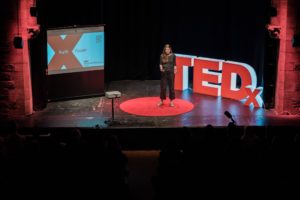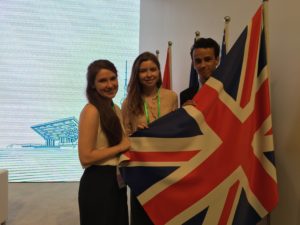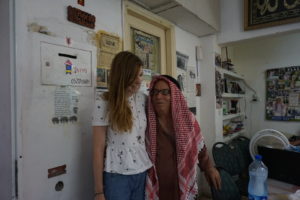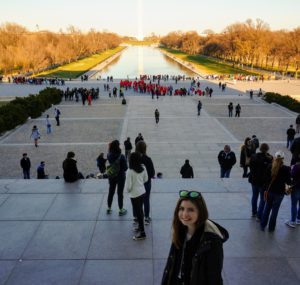In the latest of our Northern Roots series, where we speak to people originally from Northern Ireland but currently living elsewhere – or vice versa – our interviewee is Ruth Foster in Edinburgh. You can follow Ruth on Twitter at @fosttweets.
1. Tell us about yourself. When did you leave Northern Ireland, and where did you go? What do you do now?
I first left Northern Ireland in 2014 to study my undergraduate degree in Religious Studies at the University of Edinburgh. I’m currently in my final year of the same degree, but let’s just say that I’ve been around since then. In the summer of my first year at university I lived and worked in Jerusalem with DFID and International Service UK through the ICS scheme. I spent my time there living in East Jerusalem and working for Palestinian youth NGOs, spending my free time between Jerusalem’s Old City and the West Bank – worlds away from my native Broughshane! I returned to Jerusalem this summer to study religion and conflict on a scholarship to the Hebrew University, and my three week trip quickly turned into a six week stint as I continue to be fascinated by that city.
Since I first left Northern Ireland in 2014 I’ve also been fortunate enough to spend time in the US, Bosnia, and also China. In China I represented the youth of the UK at the G20 summit in 2016, putting Northern Ireland on the map as the only representative from a devolved state in the UK delegation (who would also have to continuously had to remind the delegates from the other 19 countries that the UK is a lot more than England/ the greater London area).
At the moment I’m currently Vice President of Edinburgh University RAG, President and Founder of Edinburgh University Pathways for Peace, a student speaker at TEDxUniversityofEdinburgh, and a contributor for TCS Network – this is all alongside working on my final year dissertation on the Northern Irish peace process and trying to fit in some kind of social life.
2. What do you think when you see the Northern Ireland of today, in the news and on social media?
I think that when people ‘go abroad’ or ‘across the water’ for university, it’s very easy for us to fall into the trap of looking at Northern Ireland through social media or the news and give it a hard time. People seem to fall into a complicated and paradoxical relationship with the Northern Ireland of today when they leave – they long for the beautiful landscape, the North coast, the potato/ wheaten/ soda bread, the craic, while also lamenting at the ‘backwardness’ of the political situation and certain social attitudes.
Obviously, things aren’t perfect, and there is some value in having an outsider’s perspective the situation in Northern Ireland today, but constantly criticising the Northern Ireland that we see via the news and social media doesn’t help anyone. It creates a negative image of Northern Ireland for those around us and an internal resentment towards home. When I think of the Northern Ireland of today in the news or social media, I always take a minute to remind myself of this.
Everything from the RHI scandal to the death of Martin McGuinness to the Assembly Election last year happened while I was on a scholarship studying at Dartmouth College in New Hampshire. While living in the US I was incredibly grateful to have the ability to hear Northern Irish voices via social media. If it wasn’t for Northern Irish twitter I would have had no way of following the 2017 Assembly election, which hardly had a feature on BBC news. When Martin McGuinness died, I read his obituary in Dartmouth’s free copy of the New York Times for students, but if it wasn’t for Northern Irish twitter again I would have had no other way of accessing the testimonies to his life and legacy written by various Northern Irish politicians and public figures, including the moving words thanks from Ian Paisley Jr.
3. Are you hopeful for Northern Ireland’s future? Will Brexit make a difference?
The youth of Northern Ireland make me hopeful for the future, the politics make me doubt that much will change. As the only part of the UK that shares a land border with an EU country, of course Brexit will make a difference to Northern Ireland’s future. I personally wasn’t in the country during the EU referendum, but I made sure to get my ‘remain’ vote for North Antrim as I believed that I was voting for a certain vision of Northern Ireland’s future – one that upholds the Good Friday Agreement and has an international outlook.

Since the EU referendum, I believe that there’s a sense of bitterness and betrayal that is fuelling the future of Northern Irish politics. At the moment, it seems like the majority who voted remain in Northern Ireland are bitter towards the politicians who gambled using our uneasy position of peace, and bitter towards those in Westminster who continue to observe Northern Ireland as a nuisance or an afterthought.
I hope that after the general election in 2017 and Brexit the rest of the UK will at least be a bit more aware of the unique social issues in Northern Ireland. Looking to the future, I really hope that I am proved wrong and that Brexit ends up being positive for Northern Ireland, so that this bitterness and resentment that the country seems to be fuelled on can be turned into something productive.
4. Do you think you will return to Northern Ireland? What could convince you to come back?
Well at the moment I’m currently searching for something to do after I graduate from Edinburgh in July, so I really don’t think that I need a lot of persuading to come back. Belfast is a fantastic city with a lot going for it, including a coffee scene which is pretty much unparalleled in the rest of the UK (this is a completely biased opinion, but seriously check out some of the places on www.belfastcoffeemap.org.uk/ and you’ll understand).

Right now I’m not sure where I’ll be after graduation, but Northern Ireland will always be home. No matter where I go in life I’ll always have our wicked sense of humour and unique pronunciation of the words ‘shower’ and ‘power’. In fact, I was once in the Old City of Jerusalem talking to a Palestinian shopkeeper who, when he heard that I was Irish, asked “when will you stop fighting each other?” I replied, laughing “we’ll stop when you stop”. Thankfully, Irish dark humour seems to translate across language barriers and various conflict zones, and he clearly found it funny.
5. What can Northern Ireland learn from the place you live now?
More diverse vegetarian options when eating out. But seriously, more acceptance of diversity in general. When I first moved to Edinburgh I was shocked by how open and confident people were in themselves. Throughout my upbringing in Northern Ireland I was taught to be reserved, and that to talk about myself or my achievements is to be boastful and proud. As a result of this we seem to have created a society of low self esteem, as we are afraid to express ourselves out of fear of causing too much of a fuss. Even with this interview I’m afraid that someone at home will read it and think that I’ve gone away and become arrogant, or when someone compliments me or comments on my achievements I have a knee-jerk reaction of “it’s not that important”. This general culture pushes people away from Northern Ireland and makes many not want to come back once they have left.
6. If Northern Ireland had a president with sweeping powers, and it was you, what would you do?
Thankfully for the future of Northern Ireland (and the rest of the world), I don’t plan on going into politics soon. Although I want to answer this question with “eradicating the subtle notions of sectarianism which still divide us as a society”, that is a long process that even a president with sweeping powers could not achieve instantly. So instead, I have a list:
1) Equal marriage
2) Reproductive rights for women
3) End of segregated education
4) Cross-community work that goes beyond Protestant and Catholic children doing arts and crafts together every once and a while. Integration, dialogue, and cross-community understanding is more than a box-ticking exercise
7. What would you like to see more of on Northern Slant?
I really love reading these Northern Roots interviews, and honestly feel honoured to have been asked to do one. I think that it’s great to see how far people from our wee country have gone, and how much of an impact we are having across the globe. For a postage-stamp-sized country on the edge of the Atlantic, we’ve really had a disproportionately sized (positive) impact on the world, and I really think that that is something that should be promoted and celebrated.
8. If you could ask three Northern Ireland politicians (past or present) to dinner, who would they be? And why?

I’ll be honest, I haven’t been able to stop thinking about this question. This question has raised a lot more questions like, do I want this dinner to be intellectual and thought-provoking? Do I use this dinner to get the inside story into the peace talks and events throughout the Troubles? Also, what would we eat at this dinner? Do I have to cook? Will there be alcohol? Will there be music?
In the end, I decided to be a bit selfish. Since I’m currently writing my undergraduate dissertation on the peace process, I would definitely invite Ian Paisley Snr and Martin McGuinness. Since it’s possible to raise people from the dead for this hypothetical dinner party could I also have Martin McGuinness from the 1970s, rather than the ‘chuckle brother’ years with Paisley? Just to mix things up.
In terms of the third guest, it’s a toss-up between Paddy Devlin, Ivan Cooper, John Hume, Bernadette Devlin McAliskey, or Chaim Herzog – sixth president of the State of Israel who was born in Cliftonpark Avenue. I’m leaning more towards inviting Bernadette Devlin McAliskey to ensure that a strong female voice is heard at this dinner table.
Alternatively, instead of hosting a dinner I would consider inviting every MLA in Northern Ireland round for a cup of tea, traybakes, and my mum’s homemade wheaten in an attempt to get Stormont up and running again.
9. Do you have a favourite quote, or mantra?
I think that I get my interest in politics, history and current affairs from my Father. Unfortunately he passed away when I was nine, but my mum describes him as “addicted” to the news – apparently, he would purchase the Daily Telegraph and the Belfast Telegraph everyday, and then go to a shop to read The Times during his lunch hour. Although I never got to discuss the issues in Northern Irish and international politics which are important to me, I always have this quote – which I found in his GCSE English Literature notebook from Coleraine Inst. – close to me:
“Be inspired by the belief that life is a great and noble calling, not a mean and groveling thing that we are to shuffle through as we can, but an elevated and lofty destiny.”
10. What’s your message for people back home?
My message to people back home and beyond has been outlined in the closing line of my TEDxUniversityofEdinburgh talk: “Physical, ideological and emotional barriers between groups are a product of human interaction, and may always exist. But if we took the time to understand our own stories and they influence how we make sense of the world, as well as the stories of those who disagree with us, we may not destroy walls, but if we’re lucky, we might just build a window to begin to understand the other side.” (you can watch the full thing here: http://youtu.be/hAW5nHz99Uo)

Also published on Medium.
